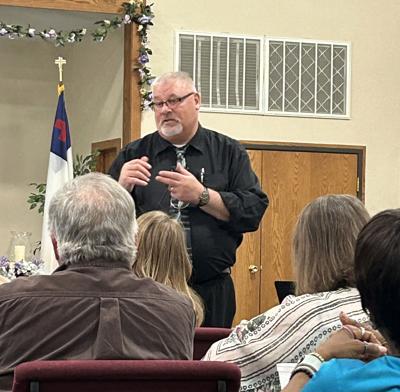The Taken movie franchise, which stars Liam Neeson as an FBI operative and parent, with a “special set of skills” that he uses to track down his daughter who has been kidnapped with the intent to sell her into a network of human traffickers, is frightening entertainment.
But Ray Fiedler said kidnapping scenarios portrayed in the movies represent only six percent of human trafficking cases. Rather, 40% of people introduced into human trafficking were brought to it by friends and family.
Identifying someone involved in the business of human trafficking is difficult according to Fiedler because there is no stereotype of what a trafficker looks like.
“The eye doesn’t see what the mind doesn’t know,” Fiedler said.
Fiedler, the director of the Iowa Office to Combat Human Trafficking, was in Burlington Saturday for two informational seminars regarding the topic at Calvary Baptist Church, on West Avenue.
Pastor Simeon Counterman, who shepherds the flock at Calvary Baptist Church also provide law enforcement chaplain support for the police departments in Burlington, Des Moines and Henry County; Burlington Fire Department and the U.S. Air Force Reserves.
Counterman said the purpose in presenting the program in Burlington was to peel back the veil and reveal that human trafficking is occurring in this community.
To learn what human trafficking is, Fiedler said it is important to know what it is not.
Fiedler said trafficking is not smuggling, where individuals pay a cartel or “coyote” to get them across the border and into the US. “They may get trafficked once they get here, but the process to get here is smuggling and they are willing to be part of that process,” Fiedler said.
It also is not sex work. Fiedler said prostitution that is consensual, where the sex worker and the john have agreed to the terms of the encounter, is not trafficking.
Trafficking involves the coercion of an individual to commit an act against their will. It sometimes involves physical force or restraint, but the main form of control is coercion and manipulation of the victim.
People are trafficked for two reasons – forced labor and sex. Trafficking victims are coerced into performing sex acts against their will or providing labor for low or no pay.
Fiedler was an agent with the Iowa Division of Criminal Investigation for 26 years when he retired – for a week – before he came back to head the human trafficking division for the state of Iowa.
Victims are found through their vulnerabilities, Fielder said. Traffickers prey on individuals who come from low means, are poorly educated, and struggle with substance abuse.
Middle school aged children are the most targeted population by traffickers, and the highest bids go to white children from affluence, Fiedler said.
“Money is the motivator in trafficking. If I’m a trafficker, I’m not dealing with a person but a piece of property. It’s all about the money,” Fiedler said.
Traffickers resort to mental manipulation, fear, and coercion to control their property, which means physical restraint and attacks are not as common although that does occur. “They take total control by various means. They take advantage of the lack of structure their victims have and cut them off from their friends and family,” Fiedler said.
“They are trauma bonded to their trafficker,” Fiedler said.
Fiedler said it is more likely a victim will be threatened with their family members being harmed if the victim refuses the traffickers demands.
The life expectancy of an individual that is being trafficked is seven years, Fiedler said. Victims often die from accidents, injuries, and suicide.
Breaking free of a trafficker isn’t impossible, but it is exceedingly difficult for the person being trafficked and is often why a person will choose to stay in the business rather than break away.
Fiedler said years of being under someone else’s control leaves victims without some of the things they need to establish an independent life. Traffickers provide for the needs of their victims which leaves that person without an identity. “They don’t usually have a credit rating or a job history, so it’s tough to rent an apartment, or get a job without any work history,” Fielder said.
Iowa Code 710.A provides the guidelines for conviction and sentencing of traffickers. Fiedler said the Iowa Legislature recently changed the code to make the penalty for trafficking a B felony, which means an individual found guilty of trafficking can receive up to a 25-year prison sentence. If the case receives a federal conviction, the trafficker will serve up to 75% of the sentence.
Trafficking a minor is now an A Felony, which means the trafficker can receive a life sentence. “It’s right up there with first degree murder. Life without parole. I have no problem with that given the stories I have heard,” Fiedler said.
The website for the Iowa Office to Stop Human Trafficking is ww.stopHTiowa.org. The site includes training materials for individuals and businesses to access to learn how to identify and report alleged trafficking. The site also includes state and national resources for traffic victims and links to report trafficking activity.








